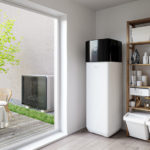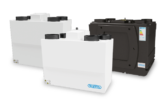Iain Bevan, Commercial Manager – Heating & Renewables at eco-technology brand Daikin UK, discusses why we’re heading in a new direction when it comes to homes heating systems and what low carbon heating technologies are currently out there.
Over the next few years, there will be big changes in how the UK’s homes are heated, with the prevalence of low-carbon heating technologies rising significantly.
While the shift to using more sustainable heating systems in homes has been growing over the years, it is the government’s more recent focus on responding to the global climate emergency and reducing greenhouse gas (GHG) emissions that is proving the catalyst to accelerating widespread adoption.
In a bid to make the UK greener, in 2019 the government made a commitment to reaching net zero greenhouse gas emissions by 2050. Since then the number of proposed legislation changes and funding initiatives to help reach this goal has increased.
With at least 15% of the UK’s GHG emissions coming from homes as a result of oil and gas usage for heating and hot water, it’s perhaps no surprise that the UK’s housing stock has become a central focus for change. And, new build homes are very much at the forefront of this transformation.
To date many of the government’s changes, which favour the use of more sustainable materials and increase the spotlight on carbon emissions, have been viewed as a nudge towards a greener future.
However, the announcement a little over a year ago that the release of the Future Homes Standard will propose the end of fossil-fuel heating systems in all new houses from 2025, marks a dramatic step-change looming for home heating.
According to the National Grid, at least eight in ten UK homes are currently fuelled by a natural gas boiler. With the technology so prevalent, it’s clear the shift away from gas will be a significant new consideration for those building new homes. Understanding the low carbon heating technologies available and making the right decisions when selecting them is vital.
Choosing the right technology
The Committee on Climate Change (CCC) recently revealed that becoming net zero by 2050 requires an annual rate of emissions reduction of 3% – that is 50% higher than under the UK’s previous 2050 goal.
To achieve this ambitious target a change in how the UK’s homes are heated needs to start now, and that means prioritising technologies that are already available and highly effective. There are a number of different eco-heating solutions on the market, each with their own benefits.
Electric boilers, for example, offer an improvement on environmental impact when compared to gas and oil. However, there are drawbacks. Not only will homeowners feel the pinch with electric boilers proving typically expensive to run, they are often unsuitable for larger properties due to the limited amount of hot water they can actually produce.
Hydrogen-based heating solutions have been a more recent source of debate, with some touting the technology due to its low carbon benefits. However, it is still a largely unproven technology and there are real questions as to its long-term viability. Additionally, the technology and resources to roll out this option across the UK are currently unavailable, which would slow installation.
Heat pump technology on the other hand can deliver both substantial carbon savings and is well-established enough to enable efficient and easy installation on a wider scale, as well as long term reliability.
There are a number of different types of heat pumps on the market – air, ground or water source – and they all work by extracting energy from one place (the source) and transferring it to the home.
Air source heat pumps are particularly efficient and one of the more cost-effective heat pump technologies to install. A typical air source heat pump will produce 45% fewer carbon emissions compared to a gas boiler, and 59% fewer than an oil boiler – a reduction of up to 43.5 tonnes of carbon emissions over the system’s typical 15-year life span per home.
An additional benefit of air source heat pumps is the variety of options available, which mean they can be installed in almost any type of home. Whether it’s for a luxury new build offering sleek design and smart technology or a practical option to fit with a more traditional heating set-up, the technology will provide flexibility while still delivering significant energy savings.









